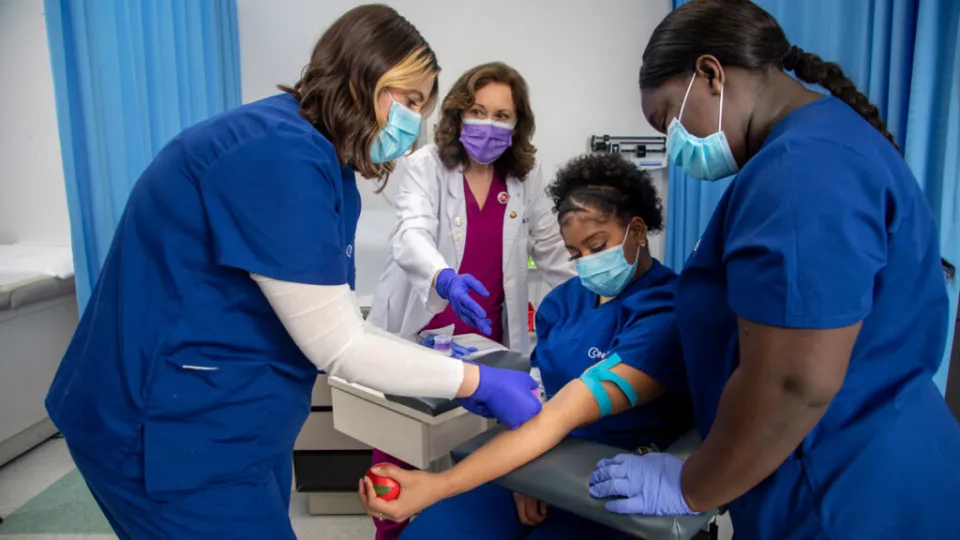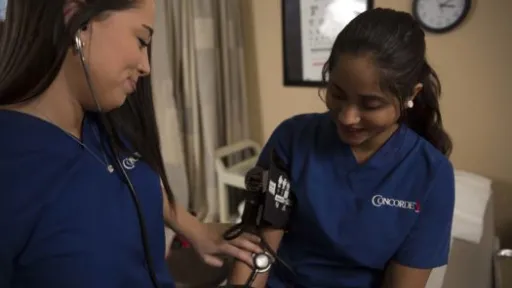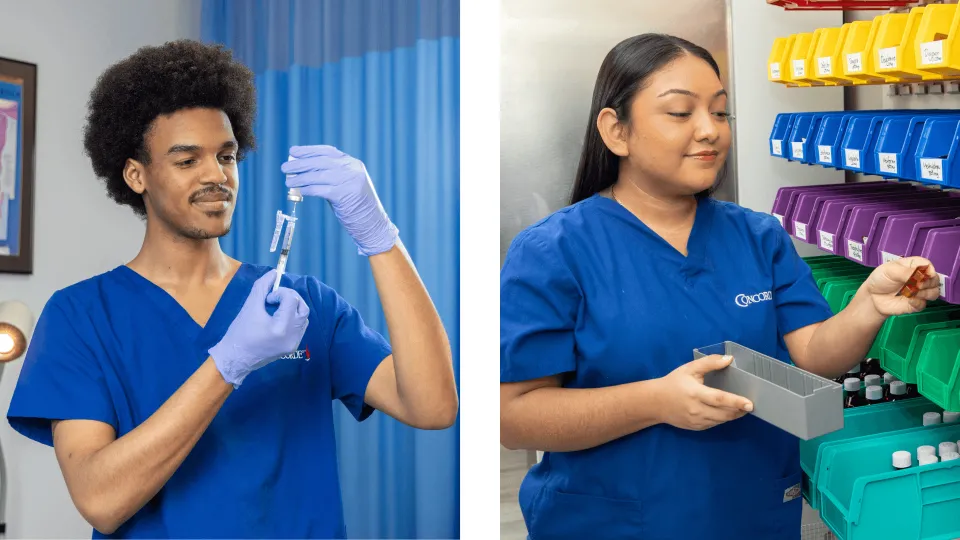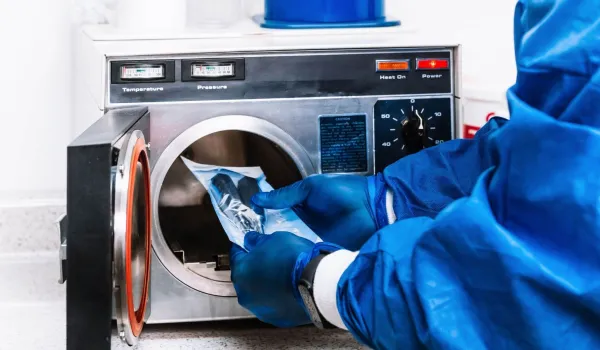
Medical assistants work alongside physicians and nurses, performing clinical and clerical tasks. This health care role is diverse, with ample job opportunities and outstanding stability. A medical assistant career may fit people with an interest in the health care industry who haven't decided between an administrative and clinical role. A medical assistant does a little of everything, so this role is a good starting point for a career in health care.
Educational Options for Medical Assistants

How To Become a Medical Assistant
There is no singular career path for medical assisting. Medical assistants can choose between a short diploma program and an in-depth associate science degree in medical assisting. Either option can offer the background necessary to begin this career relatively quickly. Consider your choices carefully to find the right career for you.
Certificate Programs
Certificate or diploma programs offer the fastest route to a career as a medical assistant. The typical duration of a certificate program is nine to 12 months. These programs usually focus exclusively on knowledge for medical assistants and don't include general topics or electives. This concise approach helps students graduate as quickly as possible.
The Medical Assistant diploma program at Concorde Career College takes as few as nine months to complete. Available at all 17 Concorde campuses, this diploma program provides the opportunity to learn how to:
- Schedule and receive patients
- Prepare and maintain medical records
- Take patient vitals and medical history
- Perform basic first aid and CPR
- Complete infection control procedures
- Conduct common diagnostic tests
- Prepare lab samples
Associate Degree Programs
The Medical Assisting Associate of Applied Science Degree offers a more in-depth program. This program typically includes 60 credit hours and may take 17 months to two years to complete. The degree program provides a broader education and includes some general topics. The associate degree program is available at Concorde's Southaven, MS or Memphis, TN campuses.
Comparison of Certificate vs. Associate Degree
Choosing between medical assistant certifications can be challenging. An associate degree may give a medical assistant a competitive edge in this career field. Employers often prefer applicants with degrees rather than diplomas, particularly when all else is equal on their applications.
But, a diploma program is a shorter and more affordable course that may better suit the needs of people who want to start their careers as soon as possible. Students can complete the diploma program and pursue a medical assisting associate degree later.
Curriculum and Skills

A medical assisting diploma or degree provides knowledge and experience in key areas such as medical terminology, anatomy, and lab procedures. Certification is essential to gaining employment as a medical assistant.
Common Topics in Medical Assisting Programs
Whether choosing a medical assistant associate degree or a diploma program, students' coursework will typically include:
- Anatomy and physiology
- Pathology
- Body systems
- Medical terminology
- Venipuncture
- Electrocardiography
- Medical front office procedures
- Laboratory diagnostic procedures
An associate degree may also include general education elements, such as:
- Computer science
- English composition
- College algebra
- General psychology
- Introduction to sociology
Clinical Skills
Medical assistants require a solid foundation in basic clinical skills to properly complete patients' charts and assist supervising physicians. These skills include:
- Taking vitals, including blood pressure, temperature, respiratory rate, and pulse rate
- Drawing blood (phlebotomy)
- Performing basic laboratory procedures
- Administering medications
- Performing ECGs
- Providing wound care and dressings
- Removing sutures
- Assisting with patient examinations
- Preparing exam rooms
Administrative Skills
Medical assistants handle many administrative tasks in the front office. Medical administration requires a robust skill set that includes:
- Answering the phone
- Setting appointments
- Managing medical records
- Inputting and maintaining insurance information
- Handling referrals for specialist care or tests
- Maintaining electronic health records
- Taking inventory of office and clinical supplies
- Submitting orders for new supplies
- Billing and medical coding
- Communicating verbally and in writing
- Managing and organizing a medical office
- Multitasking and time management
- Using medical software
Related: Medical Assistant Duties | Medical Assistant: A Comprehensive Guide to the Profession
Certification and Licensure
Medical assistants have no standard licensure but can pursue several certifications in this field. Certification isn't always required, but it can improve applicants' employability and demonstrate their commitment to this career path.
National Certification Options
The gold standard of medical assistant certifications is the Certified Medical Assistant (CMA) designation from the American Association of Medical Assistants. To sit for the CMA exam, candidates must graduate from an appropriate medical assistant program that includes anatomy, physiology, pharmacology, and relevant math.
The CMA exam includes 200 questions administered in four 40-minute sections. To maintain CMA certification, medical assistants must retake the exam or complete 60 continuing education hours every 60 months.
Though less prestigious, other organizations offer medical assistant certifications, including:
- Registered Medical Assistant from American Medical Technologists
- National Certified Medical Assistant from the National Center for Competency Testing
- Certified Clinical Medical Assistant from the National Healthcareer Association
- Certified Medical Administrative Assistant from the National Healthcareer Association
- Registered Medical Assistant from American Allied Health
- Medical Assistant Certification from the American Medical Certification Association
- Clinical Medical Assistant Certification from the American Medical Certification Association
State Requirements
Washington is the only state that requires registration for all medical assistants. However, 10 states require specialized training or certification for specific tasks such as administering medication or drawing blood. Medical assistants in any state may enjoy better employment opportunities if certified. Applicants should check their state's requirements for a more detailed understanding of the certification they need.
Related: RMA vs. CMA: Comparing Medical Assistant Certifications
Career Outlook and Advancement

Medical assistants are well positioned for a long and successful career in health care. There's great demand for these health care professionals and plenty of opportunities for career advancement with continuing education.
Job Growth
Medical assistants can anticipate a projected 15% increase in job opportunities between 2023 and 2033. This growth is nearly four times higher than the national average of 4% for all occupations and even outpaces the 12% growth projected for other health care support occupations.
Much of this growth is due to the aging baby boomer generation. These seniors are aging into retirement and leaving job openings. They're also entering a time when they may require additional medical care. Medical assistants are perfectly poised to assist with the growing need for health care professionals by offering clinical and clerical skills to help fill the gaps in any health care environment.
Career Advancement Opportunities
Once a medical assistant has some industry experience, they may find that they'd prefer to focus on either clerical or clinical work. Concorde offers the Bachelor of Science in Healthcare Administration for advanced opportunities in the non-clinical side of health care. This degree route for graduates of associate degree programs in healthcare-related fields may offer opportunities in the medical office manager or health care administrator fields.
Those who discover a passion for hands-on patient care may choose to pursue an associate degree in Nursing to become a registered nurse.
Related: A Day in the Life of a Medical Assistant | Medical Assisting Positions: Job Duties, Outlook and Environment
Choosing the Right Educational Path
Whether you're interested in a medical assistant associate degree or a shorter diploma program, it's important to choose the right school for your education. Look for an accredited program that can prepare you to sit for the CMA exam upon completion. The best programs include internships or externships so you can get hands-on experience with clinical tasks. Stay open to constructive criticism throughout your education and maintain a professional demeanor to prepare yourself for a successful career in medical assisting.
If you're interested in working as a medical assistant, Concorde can help you get started on your educational path. With both diploma programs and associate degree options, there's something for every type of student.
Medical Assistants : Occupational Outlook Handbook: : U.S. Bureau of Labor Statistics. (2019, September 4). Bls.gov. https://www.bls.gov/ooh/healthcare/medical-assistants.htm#tab-6
Take The Next Step Towards a Brighter Future
Interested in learning more about our Medical Assistant program?
We have a Concorde representative ready to talk about what matters most to you. Get answers about start dates, curriculum, financial aid, scholarships and more!







